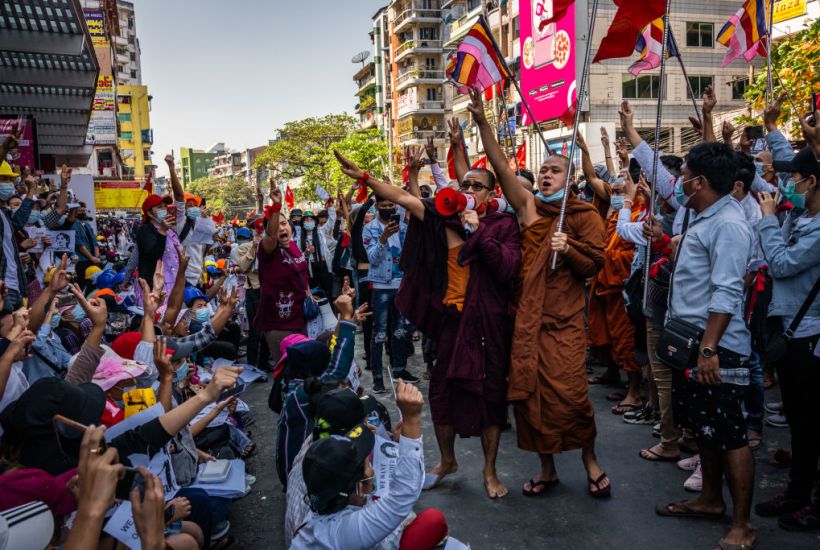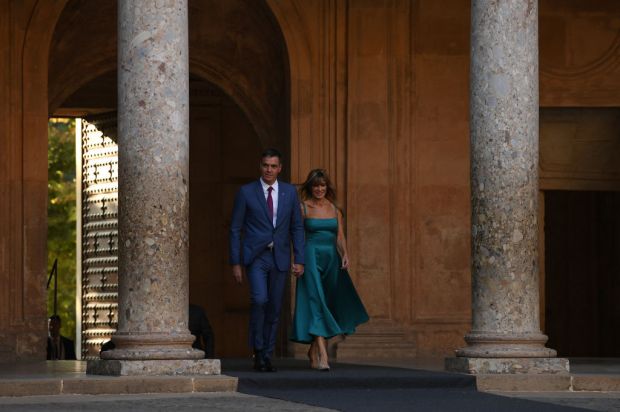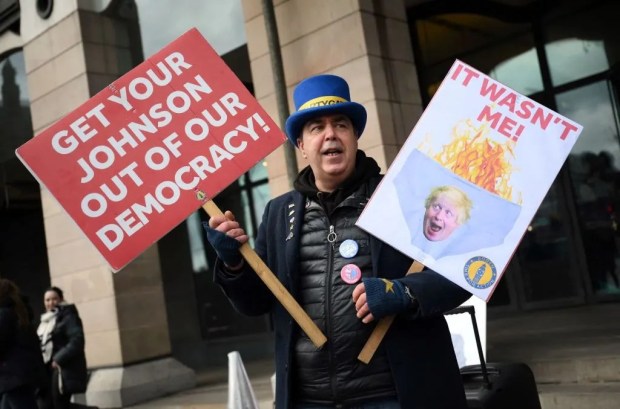In what could transpire to be a significant development, Buddhist monks joined tens of thousands of anti-coup protesters in the Burmese capital of Rangoon on Wednesday. This is the sixth continuous day of mass demonstrations since the military seized control.
In a country where over 80 per cent of the population are Buddhists – and devoutly so – men of the cloth are influential. In fact, saffron-robed monks taking to the streets in 2007 paved the way for an end to 49 years of military rule in Burma in 2011. Along with China, they are key to restoring democracy in the south-east Asian state.
On 1 February Burmese generals again seized full control of the country, terminating a five-year power sharing agreement with the National League for Democracy (NLD) party led by Nobel Peace Prize winner Aung San Suu Kyi. She, along with the country’s president, Win Myint, and an unknown number of NLD leaders and members of civil society, have been detained. Diplomats have been denied access to them.
Three months ago, NLD was re-elected on a landslide and Suu Kyi was about to commence her second term in office. The daughter of Burma’s independence hero General Aung San, she remains immensely popular with the electorate, notwithstanding the respect she lost internationally after failing to condemn the alleged genocide of Muslim Rohingya by Burmese security forces.
There has not been genuine civilian government in Burma since the military coup in 1962. Even when Suu Kyi became State Counsellor, the military was covertly in-charge. Indeed, they constitutionally hold the cabinet portfolios of home, defence and border affairs. Now they have dispensed with the charade.
The move has been met with a widespread expression of public displeasure, especially in Rangoon, the country’s biggest metropolis. Protests have continued in Rangoon despite a ban being introduced on gatherings, under a state of emergency promulgated by the junta. An internet blackout has failed to stop the protests too. Nor have they diminished in size in the face of rubber bullets, tear gas and water cannons.
In the past, the military dictatorship gunned down dissenters and arbitrarily imprisoned citizens, including Suu Kyi, who was placed under house arrest. But the military are now dealing with a new younger generation, who have tasted freedom and Facebook. The BBC Burmese Service has estimated crowds in excess of 100,000, before they melt away as the curfew begins in at nightfall. Can these be sustained if and when the security forces become brutal? More than once before, such state violence has turned the tide of resistance.
The Burma situation is the first big foreign policy test of the United States President. Biden passed an executive order imposing economic sanctions on military leaders and their close family members and is freezing £900 million held by the Burmese government in the US. ‘We are also going to impose strong export controls (on Burma),’ he said. He also indicated an end to the isolationism of his predecessor, adding: ‘We’ll continue to work with our international partners to urge other nations to join us in these efforts.’
In a TV address, the military chief General Min Aung Hlaing suggested this coup was ‘different’ and promised to hold elections at the end of a one-year emergency period under a ‘reformed’ election commission. The State Department emphatically says this as a ‘non-starter’.
At the same time, Britain, which is presiding over the United Nations Security Council this month, secured China’s signature on a strong, unanimous statement issued by the 15-member body.
Since August 2017, the US has extended around £900 million in aid to Burma. The US believes this provides leverage. But Washington has chosen to work in tandem with allies, because ‘they act as force multipliers’, as the State Department put it. ASEAN, Britain, France, Germany, Japan and India, which has a long porous border with Burma, are among the partners in the policy. Targeted sanctions against individuals and entities involved with the military are imminent.
Buddhism in Burma is split between moderates and militants. The hardliners gained ground after the military lifted restrictions in 2011. MaBaTha, a prominent extremist group, has painted the NLD as westernised liberals who do not defend the faith. It has instead preferred to support a military proxy: the Union Solidarity and Development Party.
But at least three moderate monks, who were outspoken critics of the military and Buddhist fundamentalists, have now been arrested in the aftermath of the coup. In effect, the tolerant wing of the clergy are potential allies in reversing the military takeover.
As for China, which is said to have opposed Suu Kyi’s overthrow, the transactional options for the US and the West are limited. US Secretary of State Antony Blinken talked tough on Xinjiang, Tibet, Hong Kong and Taiwan when he spoke on the phone with Yang Jiechi, director of China’s foreign affairs commission last week. In this frosty atmosphere, Chinese cooperation may be difficult to foster.<//>
Got something to add? Join the discussion and comment below.
Get 10 issues for just $10
Subscribe to The Spectator Australia today for the next 10 magazine issues, plus full online access, for just $10.




















Comments
Don't miss out
Join the conversation with other Spectator Australia readers. Subscribe to leave a comment.
SUBSCRIBEAlready a subscriber? Log in